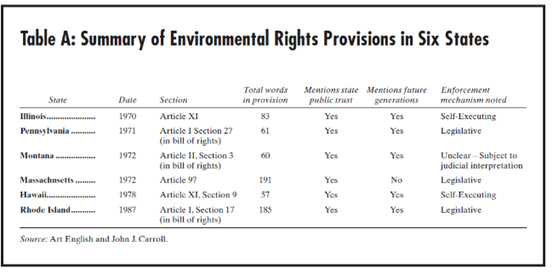BILL
SUBJECT
DATE
The proposed legislation would amend the New York State Constitution to establish a “self-executing right” that each person shall have a right to clean air and water, and a healthful environment. The Business Council opposes the establishment of a self-executing right because the provision provides an unwarranted threshold level of standing absent accompanying legislation. Furthermore, The Business Council fails to see the benefit in providing a direct right of action under the state constitution to remedy an environmental condition because there are numerous adequate remedies available under current state law.
We also find it highly debatable that the addition of a self-executing constitutional environmental right would increase environmental protections. The more likely outcome is the creation of needless and duplicative litigation. Current state and federal law provide abundant environmental protections, and regulators already police environmentally harmful conduct. Judicial review of most environmental issues is readily available under Article 78 of the Civil Practice Law & Rules, and citizen suits can be brought to authorize enforcement of environmental statutes.
Self-Executing Right
A self-executing provision creates a legally enforceable right in and of itself; it does not require corresponding legislation to enable individuals to assert a claim based on the provision.
Before anyone can truly understand the impact of this provision, through case law the courts must develop the bounds of the environmental right, by ruling which causes of action can be asserted and against whom, what remedies are available, and the level of proof needed to demonstrate injury or harm. In addition, the court must determine exactly what constitutes a "healthful environment".
Unlike statutory law, self-executing rights do not serve as an effective deterrent, because parties are unclear until a court makes a determination if they have breached an individuals’ right to a healthful environment. Under current law, if a party causes a drinking water system to be in exceedance of an adopted health standard that party can be held responsible. The party also knows when handling that product that failure to handle it consistent with current rules and regulations can result in enforcement.
Furthermore, self-executing rights provide a right of recovery but they don’t contain criminal penalties. New York has numerous statutory environmental protections that contain criminal penalties.
The New York State Constitution
The New York State Constitution’s Conservation Article, Article XIV, has had an indelible impact on conservation in the state. The Article is made up of five sections. The first three sections create a State Forest Preserve, protecting forest lands in the Catskills and Adirondacks.
In 1969, Section 4 was included to provide a “Conservation Bill of Rights” and it remains a bold statement of conservation policy and a potential source of rights for New Yorkers. Some have even interpreted the provisions to be self-executing, “the environmental provisions in the Hawaii and New York constitutions are self-executing because they refer to individuals' right to enforce compliance without any further legislation."1
Section 4 states [the policy of the state shall be to conserve and protect its natural resources and scenic beauty and encourage the development and improvement of its agricultural lands for the protection of food and other agricultural products. The legislature, in implementing this policy, shall include adequate provision for the abatement of air and water pollution and of excessive and unnecessary noise, the protection of agricultural lands, wetlands and shorelines, and the development and regulation of water resources. The legislature shall further provide for the acquisition of lands and waters, including improvements thereon and any interest therein, outside the forest preserve counties, and the dedication of properties so acquired or now owned, which because of their natural beauty, wilderness character, or geological, ecological or historical significance, shall be preserved and administered for the use and enjoyment of the people. Properties so dedicated shall constitute the state nature and historical preserve and they shall not be taken or otherwise disposed of except by law enacted by two successive regular sessions of the legislature.] - N. Y. CONST., art. XIV, § 4
Shortly after Section 4 was adopted the Legislature enacted new legislation including: the State’s Endangered Species Act, Tidal and Freshwater Wetlands Acts, Wild and Scenic Rivers Act, and New York’s implementing statutes for the federal Clean Air Act, Clean Water Act, and laws on solid and hazardous wastes. The aforementioned legislation provides numerous adequate remedies of environmental conditions under state law.
Other States
Six other states have environmental bill of rights. Few of the bills of rights have been self-executing; most are dependent upon a specific statutory enforcement mechanism. The last state to adopt a bill of rights was Rhode Island in 1987. The last state to adopt a self-executing environmental right was Hawaii in 1978. 2

However, Hawaii's environmental right attempts to define "healthful" in its text using the standards set in federal and state environmental quality laws.
Uncertainty for the People of the State of New York
Abstract goals and visions can be a positive, but unenforceable abstract notions of a healthful environment will create significant uncertainty, which can and will be significantly negative. The Supreme Court of Pennsylvania struggled with these issues when it considered how to apply Pennsylvania’s environmental rights provision in Commonwealth v. National Gettysburg Tower, Inc. The court considered all aspects of Pennsylvania’s environmental rights, and was clearly concerned about possible due process and equal protections issues resulting from arbitrary enforcement. In fact, the court openly questioned the provision’s application to private property “[A] property owner would not know and would have no way, short of expensive litigation, of finding out what he could do with his property."3 There is no need for New York to make the same mistakes.
1“Judicial Interpretation of State Constitutional Rights to a Healthful Environment” by Mary Ellen Cusack, Boston College Environmental Affairs Law Review, Volume 20 Issue 1 Article 7
2 “State Constitutions and Environmental Bills of Rights” By Art English and John J. Carroll
3 Commonwealth v. Nat’l Gettysburg Battlefield Tower, Inc., 302 A.2d 886 (Pa. Cmwlth. 1973)